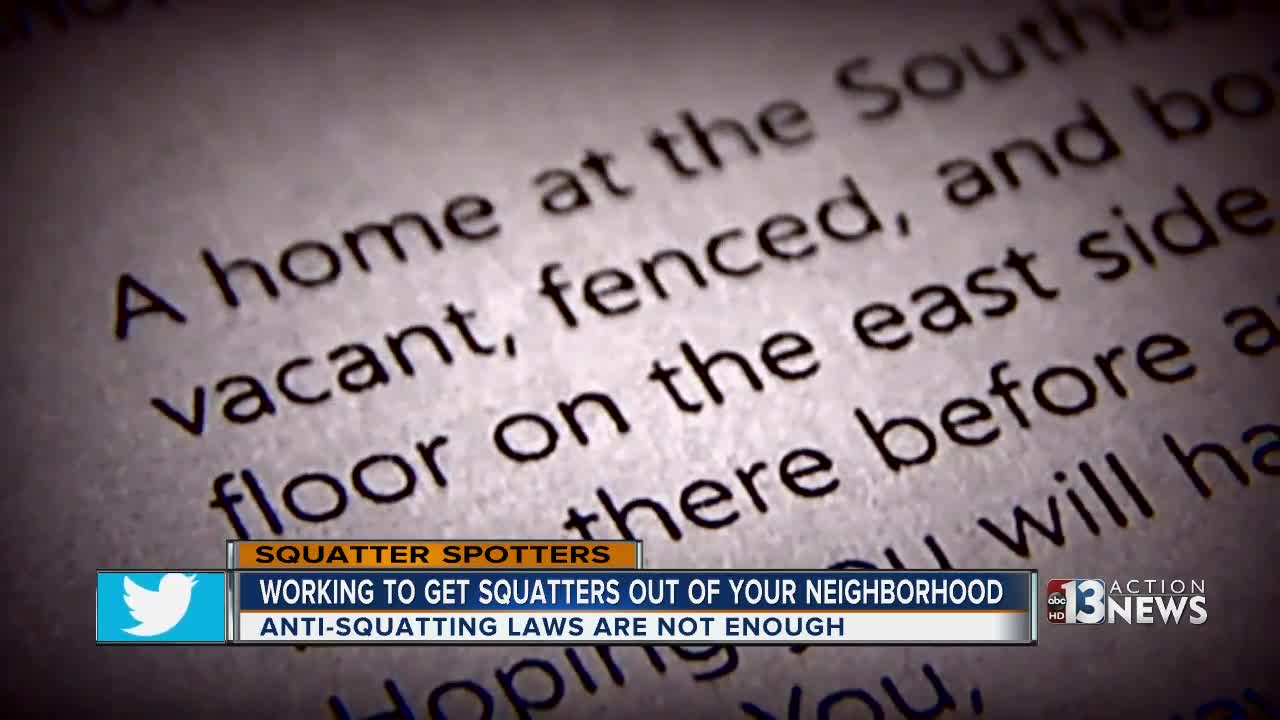Squatters are destroying homes, devaluing neighborhoods and wreaking havoc in our communities. While we know many of you are at the breaking point, Contact 13 continues to press for answers.
In the battle to take on squatters and get them out of the vacant house on your street, Nevada legislators passed a trio of anti-squatting laws in 2015.
But we're still hearing that's not enough. Do police have the authority they need to squash our valley's squatter problem? I'm taking your concerns and questions to lawmakers while we continue to hear about the nightmares in our neighborhoods.
We're hearing your complaints that squatters are out of control so we wanted to help make a difference.
Since last summer hundreds of you sent emails to squatterspotters@ktnv.com
Many frustrated neighbors think nothing is getting done.
"I realize that there's still a lot of people in Nevada who are complaining about squatters," says Assemblyman Edgar Flores. "This issue is not going away."
Flores was just as perplexed as you are about squatters.
"What's going on that we have individuals invading homes and we can't get them out?," asks Flores.
He says Nevada law was silent on the issue of squatters, which prompted the legislature to pass the Housebreaking, Unlawful occupancy and Unlawful reentry laws.
"Let's create some definitions and criminalize the act of squatting," says Flores.
Last summer, Metro told us that was good news.
"A gross misdemeanor for a first offense, that gives a little bit more teeth to try to thwart this," said Lt. Nick Farese.
But many neighbors tell Contact 13 cops are still saying they can't make arrests without contacting the homeowner--even if it's bank-owned or in foreclosure limbo.
Darcy: "Is the spirit of that law intended to allow law enforcement to take swifter action without going through the rigamarole of contacting the bank, for example?"
Flores: "Yes."
Darcy: "You don't have to have that homeowner victim to make an arrest under the house-breaking law. That's correct?"
Flores: That's correct.
Flores says that part can come further down the line through the court process, but cautions it's still complex and there must be due process. Cops can't just kick down doors and take people away.
But, by making second offenses felonies..."then Metro does have the option there of getting a search warrant," says Flores.
Flores says lawmakers are working on additional bills this session to help police, including requiring notarized leases.
"I ask you to be patient with law enforcement," says Flores. "I understand that sometimes we want them to be able to resolve our issues overnight."
He says police, utilities, neighbors and banks must all work together to solve a problem for which there is no magic bullet.
Darcy: "Neighbors across the Valley are so frustrated with this issue. What's the message to them?"
Flores: "I promise you you're not alone in this fight. We're all at the table. And we're beating our heads against the wall--I promise you in an exhaustive manner--until we get this resolved. And we won't stop."
Metro told us they've made over 60 arrests under the new laws and provided the following information:
It’s important for the community to understand that in most all cases, these investigations are lengthy and take time. Though citizens expect a response and immediate resolution, it is extremely rare that patrol officers in the field are able to resolve ongoing squatter issues at the scene. Additionally, people may call to report “squatters” when in reality, the problem is different. For example: a homeless man sleeping in a shed of a vacant property would not be considered a squatter. Subjects entering an abandoned residence and committing crimes inside (drug use, theft, vandalism, or hosting parties) are not squatters. True squatters are those who have established residency and knowingly provide false documentation (which must be proven to be false) permitting them to be in the home.
Though neighbors call and may provide information suggesting that the occupants are “squatters”, officers must have probable cause to make immediate arrests using existing laws like the housebreaking and unlawful occupancy statutes. Many times that does not come from neighbor’s statements alone. Additional documentation is almost always required which may not be available to the officer. An option is to make a station report. Citizens may bring supporting documentation and evidence for submission. After reports are taken they’re forwarded to detectives for review. Detectives follow up on cases according based on priority wherein violent crimes, gang crimes and crimes involving guns get the highest attention. As you’re aware, we’ve experienced a dramatic increase in violent crimes across the US; Las Vegas is no different.
When appropriate and when probable cause exists, officers and detectives do in fact use the anti-squatting laws.




